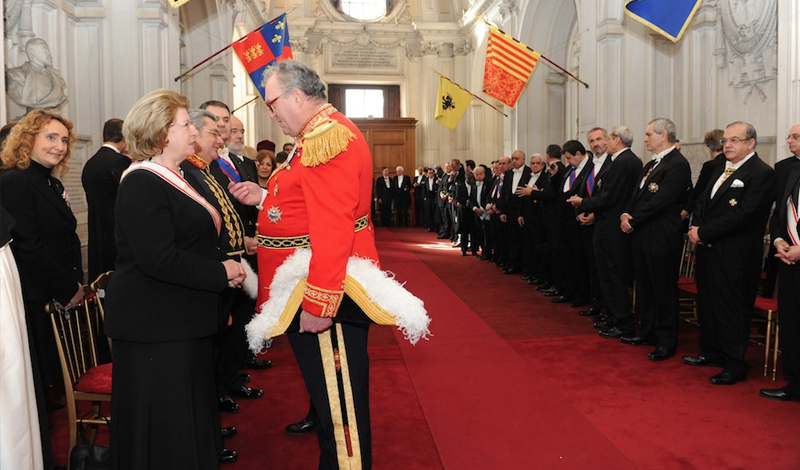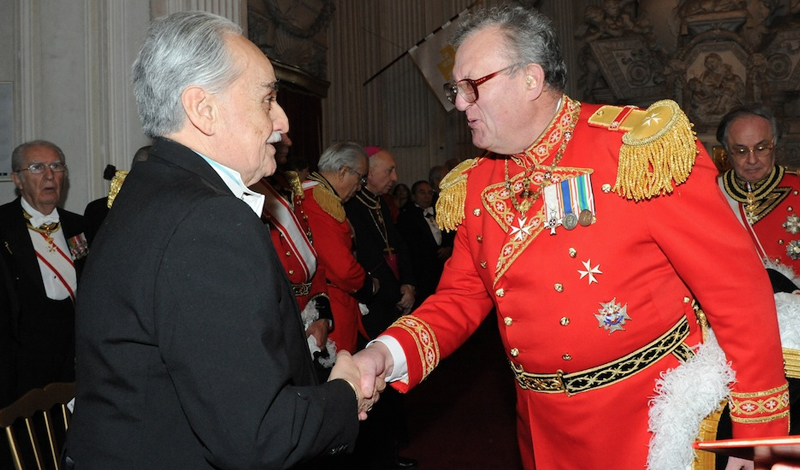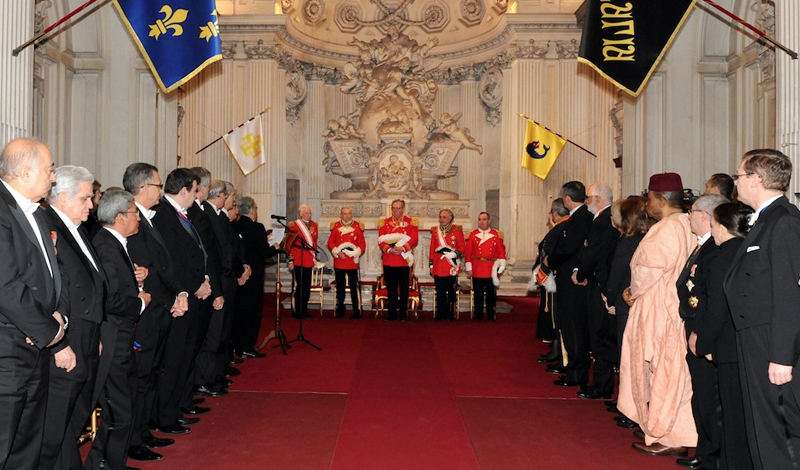Yesterday the Grand Master Fra’ Matthew Festing received in audience the Diplomatic Corps accredited to the Sovereign Order of Malta, to exchange greetings for the new year. The meeting was held in the Magistral Villa in Rome.
Here is the address of the Grand Master.
Mr. Doyen, Excellencies, Ladies and Gentlemen,
I am delighted to welcome you today for this traditional exchange of greetings at the beginning of the New Year. I also wish to thank the Doyen of the Diplomatic Corps, H.E. Ambassador Valladares Lanza, for his kind words in conveying your greetings and appreciation for the Order of Malta and its millenary hospitaller mission.
May I extend my very best wishes to you all, and especially welcome the ambassadors of Chile, Hungary, Italy, Mali, Democratic Republic of the Congo, Slovenia, Romania, El Salvador, Austria, Liberia, Thailand, Colombia, Brazil, Seychelles, Croatia and Spain, who have presented their letters of Credence last year.
****
During 2011, I had the opportunity to make Official Visits to Romania, the United Nations in Geneva, the Principality of Monaco, Liechtenstein, San Marino, and Chile; and I was delighted to welcome important official delegations from foreign governments and from the European Union here in Rome, always with the aim to deepen our friendly relations and further develop the basis of our mutual cooperation.
In this respect, the Order signed a number of international Cooperation agreements during the past year with Liberia, Morocco, the Dominican Republic, Kenya, and the World Health Organization together with the government of Mali, to further enhance cooperation on projects within the hospitaller and health sector. During my State Visit to Chile last November, we signed a memorandum of understanding with the Chilean Government to adhere to the Humanitarian Aid Network in Chile with the objective to set up a timely and efficient coordination of humanitarian action, should the country be struck again by an emergency situation as was the case in 2010.
The Order shared in two joyful events for the Church last year. The first was the celebration of the Beatification of the greatly admired Pope John Paul II in May, which was attended by a high-level delegation of the Sovereign Order of Malta. The second happy event was the 60th anniversary of Pope Benedict XVI’s priesthood in June. I would like to express on this occasion our deep appreciation for his spiritual and moral guidance, especially in these difficult times.
Also in June, our host country celebrated the 150th anniversary of Italian Unification and I was particularly pleased to accept the invitation of the President of the Republic Giorgio Napolitano to take part in the celebrations on the 2nd of June, the feast of the Republic. We are very proud of the close bonds of cooperation that bind us with the Italian Republic and deeply touched by the warm welcome we have always enjoyed here in Italy.
****
As the European Year of Volunteering has drawn to an end in 2011, I would like to particularly recognise the significant work carried out by volunteers in the social works of the Order of Malta.
In Italy, we celebrated the twentieth anniversary of the agreement under which 3,000 volunteers from the Order of Malta’s Italian Relief Corps – CISOM – have worked together in the Italian civil protection system. Their most recent intervention was about the extensive floods in Liguria and Tuscany last October.
In Ireland, the Order of Malta’s ambulance service, founded in 1938, is a major provider of first aid training, ambulance transport and community care services in most of the major towns throughout the country. The Ambulance Corps is operated entirely by 3,200 volunteers, under the direction of the Irish Association of the Order.
In Austria, the Order’s many activities are performed by volunteers, such as regular ambulance services and assistance for the elderly and disabled. The ambulance service was operated by 1,200 volunteers in 2011.
In Germany more than 35,000 volunteers of the Order of Malta work alongside 30,000 employees in 700 locations around the country. Every year they provide medical, social and humanitarian assistance to more than twelve million people in Germany and to many countries, in particular in Central and Eastern Europe.
In France over 13,000 permanent volunteers contribute to the wide range of social interventions in medico-social centres and hospitals specialised in neurological rehabilitation, for handicapped children, Alzheimer persons, and homeless people.
In Romania, in Albania and in Lithuania, our volunteer corps celebrated their 20th anniversaries of existence in 2011. Founded in the period immediately after the fall of the iron curtain, they provided, and continue to provide, indispensable aid to the populations of these countries.
The Order of Malta’s relief corps in Hungary, is one of the major welfare organisations in the country, and a trusted partner of Hungarian institutions with 5,000 permanent and 15,000 ad hoc volunteers. It runs almost 200 social organisations and also works in the civil protection area, with its own team to assist victims of natural disasters both in Hungary and abroad.
While this is to highlight the major volunteer corps of the Order of Malta, there are numerous others who make a huge difference by offering their free time to help alleviate the suffering and improve the life of the most disadvantaged of society.
****
Given the major natural catastrophes that struck again countries in Africa, Asia and South America in 2011, the Order of Malta was again very active in providing emergency relief and rehabilitation programmes in the areas of water, sanitation and hygiene as well as nutrition in countries such as those in the Horn of Africa, Pakistan, Sri Lanka, Cambodia, Bolivia, Japan, DR of Congo, and the Philippines. Moreover, all these events have shown that disaster preparedness projects to teach the population to cope with such calamities are becoming increasingly important and the Order of Malta’s international relief service is actively working with local communities in Vietnam, Myanmar, Chile and Haiti.
But instead of giving you a full list of interventions globally, of which you might have already heard on several occasions during the year, I would like to highlight some of our newer projects, which started in 2011, and whose results will be seen over the coming years.
First initiative: As highlighted by His Holiness Pope Benedict XVI, education is an important element in today’s secularised world to teach values and provide children with the hope of a future. The Order of Malta has decided to take on this challenge, with a view to linking the education of young people with the engagement in humanitarian work. As a result, the German Association has taken over the responsibility for a secondary school with 1,200 pupils in Willich, and intends to take over two further schools in Westphalia and Rhineland in the coming years.
Second: Last November, on the occasion of the Order’s VIII Conference of the Americas hosted by our Peruvian Association in Lima, over 200 delegates from 24 National Associations and 20 Embassies in the region participated in this important assembly to discuss the coordination of our humanitarian and diplomatic activities. It has been decided to open a Regional Office in Miami in order to coordinate and facilitate emergency aid on the continent in event of natural disasters.
Third: Despite the more visible emergency interventions, a major part of the Order of Malta’s activities around the world is to help the most disadvantaged of society, who do not tend to be the focus of media attention, or placed high on national agendas. Some of these forgotten causes concern the elderly, the persecuted, abandoned and disabled children, refugees, untouchables, and the homeless.
In order to intensify the efforts to raise funds and awareness for these forgotten causes around the world, we have launched a new international vehicle – the Order of Malta’s Global Fund for The Forgotten People – to support the longstanding existing local works of the Order that can make a real difference.
Fourth: Last September, we have opened relations with the Palestinian Authorities with the aim to ensure the already existing activities of our Holy Family Maternity Hospital located in Bethlehem; but also to extend our medico-social activities through the development of new health projects and income-generating programmes. A micro-credit scheme will be put in place with the aim to reduce poverty and rural exodus through a sustainable socio-economical development, thus safeguarding the multicultural heritage which is so precious in this region.
****
As a last point, I would like to share with you some of our thoughts about the future of humanitarian operations.
Since large humanitarian operations took place in Iraq, Afghanistan, Darfur, Sahel and recently Haiti, crisis resolution has been constantly evolving and now largely affects the relationship between military forces, diplomats and humanitarian organizations.
The increasing involvement of the mass-media, multinational companies, private security firms and non-state actors, often with different objectives, has raised the issue of having the various actors cohabitate, co-operate and when possible, integrate on the ground.
Simultaneously, the humanitarian aid is challenged by new forces:
– War has increasingly shifted from conflicts between nations to intra-state, regional and civil conflicts;
– The lines between military operations and humanitarian assistance are less clear;
– Civil populations living in affected countries are the first victims of such situations, along with humanitarian aid workers;
– International humanitarian law rules and conventions are no longer observed;
– Modern crises also come out of natural disasters, floods, drought, migration, cultural diversity and poor water management;
– In many cases, the way out of crisis depends on continuity in educational, cultural and scientific structure to speed up reconstruction.
A number of Western countries have been trying to find solutions by implementing political, military and humanitarian strategies and increasingly delegating their powers, together with significant financial assets, to multilateral organizations and international NGOs. Many harmonization attempts have been made, but no overall guidelines have yet been developed, because each crisis is unique.
A new approach is therefore necessary: while the change of relationships between humanitarian organizations, diplomats, civilians and military forces is not new, the recent concepts of “duty to interfere” and “responsibility to protect” have paved the way for what is now called “humanitarian diplomacy”.
It is with this objective in mind that the Sovereign Order of Malta and the French Navy, who share the same concerns, organised at the headquarters of the UNESCO in Paris, last January, a Conference on Humanitarian Diplomacy and the Management of International Crisis.
The aim of the conference, in which participated recognized personalities representing the military, the diplomacy and civil institutions involved in humanitarian actions, was to help define the practices and courses of action which should be implemented by the various actors on the ground and delineate the aims and ethics of these types of deployment.
Several important recommendations were made on this occasion, which are to be published soon. Among them, I wish to recall what the European Commissioner for Humanitarian Aid and Crisis Response Ms Kristalina Georgieva pointed out on this sensitive topic during the Conference:
– We need more global financial resources for humanitarian aid, especially from the private sector, and through public-private partnerships;
– We need to improve aid effectiveness by strengthening the performance and delivery capacity of the humanitarian system, which means to collectively be better prepared to address large scale disasters, to improve on-the-spot leadership and coordination, and especially the roles of UN Humanitarian coordinators and of UN-led system of clusters;
– We need to “de-compartmentalise”, as she says, policy areas in the management of disasters and crisis. People need to get out of their bunkers!
As we all know, everybody wants to coordinate, but nobody wants to be coordinated!
And I would like to add what the General Director of the UNESCO, Ms Irina Bokova, rightly recalled: nothing symbolizes respect between nations more than the way in which a country treats the cultural heritage of another country. Attacks on cultural symbols signal an escalation in violence. They quicken the moral dislocation of societies by aiming to touch people in what they hold dearest and deepest. The destruction of the Buddha statues of the Bamiyan Valley in Afghanistan, and the devastation of museums in Kabul and Baghdad are just some examples.
This international conference, which gathered over 400 diplomats, militaries and humanitarian leaders during two days at UNESCO’s headquarters in Paris, was essential to contribute to the common search for the guiding principles the different actors on the ground have to adopt. It also showed the urgent need to define guiding ethic principles, not only of the large humanitarian agencies, but also of the armed forces, politicians, religious leaders, entrepreneurs, opinion leaders and civil society in general in crisis areas.
I believe that the Countries and governments you represent, dear Ambassadors, can greatly help to build a “renewed global consensus on the goals, norms and principles for humanitarian assistance”.
****
2011 has seen many changes on the international scene, of which some will only come to full effect this year. Natural Catastrophes, economic instability, political changes, ongoing violence on the basis of ethnical and religious differences as we have again sadly witnessed over the last couple of weeks, and a fast growing population will require more than ever that we work together to promote the peace and stability of peoples by reasserting the centrality of human dignity. I therefore wish to conclude by confirming the Sovereign Order of Malta’s desire to further strengthen international cooperation with your governments and local authorities.
I thank you all for the work you carry out in the service of your respective countries and may conclude with my best wishes for the New Year to you and your families, and for the prosperity and harmony of the Nations that you so worthily represent.












